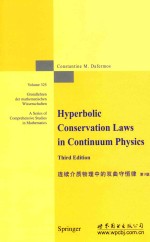图书介绍
连续介质物理中的双曲守恒律 第3版=HYPERBOLIC CONSERVATION LAWS IN CONTINUUM PHYSICS THIRD EDITION 英文PDF|Epub|txt|kindle电子书版本网盘下载

- 黄少锋编著 著
- 出版社:
- ISBN:
- 出版时间:2015
- 标注页数:0页
- 文件大小:114MB
- 文件页数:745页
- 主题词:
PDF下载
下载说明
连续介质物理中的双曲守恒律 第3版=HYPERBOLIC CONSERVATION LAWS IN CONTINUUM PHYSICS THIRD EDITION 英文PDF格式电子书版下载
下载的文件为RAR压缩包。需要使用解压软件进行解压得到PDF格式图书。建议使用BT下载工具Free Download Manager进行下载,简称FDM(免费,没有广告,支持多平台)。本站资源全部打包为BT种子。所以需要使用专业的BT下载软件进行下载。如BitComet qBittorrent uTorrent等BT下载工具。迅雷目前由于本站不是热门资源。不推荐使用!后期资源热门了。安装了迅雷也可以迅雷进行下载!
(文件页数 要大于 标注页数,上中下等多册电子书除外)
注意:本站所有压缩包均有解压码: 点击下载压缩包解压工具
图书目录
Ⅰ Balance Laws1
1.1 Formulation of the Balance Law2
1.2 Reduction to Field Equations3
1.3 Change of Coordinates and a Trace Theorem7
1.4 Systems of Balance Laws12
1.5 Companion Balance Laws13
1.6 Weak and Shock Fronts15
1.7 Survey of the Theory of BV Functions17
1.8 BV Solutions of Systems of Balance Laws21
1.9 Rapid Oscillations and the Stabilizing Effect of Companion Balance Laws22
1.10 Notes23
Ⅱ Introduction to Continuum Physics25
2.1 Bodies and Motions25
2.2 Balance Laws in Continuum Physics28
2.3 The Balance Laws of Continuum Thermomechanics31
2.4 Material Frame Indifference35
2.5 Thermoelasticity36
2.6 Thermoviscoelasticity44
2.7 Incompressibility47
2.8 Relaxation48
2.9 Notes49
Ⅲ Hyperbolic Systems of Balance Laws53
3.1 Hyperbolicity53
3.2 Entropy-Entropy Flux Pairs54
3.3 Examples of Hyperbolic Systems of Balance Laws56
3.4 Notes72
Ⅳ The Cauchy Problem75
4.1 The Cauchy Problem:Ciassical Solutions75
4.2 Breakdown ofClassical Solutions78
4.3 The Cauchy Problem:Weak Solutions81
4.4 Nonuniqueness of Weak Solutions82
4.5 Entropy Admissibility Condition83
4.6 The Vanishing Viscosity Approach87
4.7 Initial-Boundary Value Problems91
4.8 Notes95
Ⅴ Entropy and the Stability of Classical Solutions97
5.1 Convex Entropy and the Existence of Classical Solutions98
5.2 The Role ofDamping and Relaxation108
5.3 Convex Entropy and the Stability of Classical Solutions116
5.4 Involutions119
5.5 Contingent Entropies and Polyconvexity129
5.6 Initial-Boundary Value Problems138
5.7 Notes141
Ⅵ The L1 Theory for Scalar Conservation Laws145
6.1 The Cauchy Problem:Perseverance and Demise of Classical Solutions146
6.2 Admissible Weak Solutions and their Stability Properties148
6.3 The Method of Vanishing Viscosity153
6.4 Solutions as Trajectories of a Contraction Semigroup158
6.5 The Layering Method164
6.6 Relaxation167
6.7 A Kinetic Formulation174
6.8 Fine Structure of L∞ Solutions180
6.9 Initial-Boundary Value Problems183
6.10 The L1 Theory for Systems of Conservation Laws188
6.11 Notes192
Ⅶ Hyperbolic Systems of Balance Laws in One-Space Dimension195
7.1 Balance Laws in One-Space Dimension195
7.2 Hyperbolicity and Strict Hyperbolicity203
7.3 Riemann Invariants206
7.4 Entropy-Entropy Flux Pairs211
7.5 Genuine Nonlinearity and Linear Degeneracy214
7.6 Simple Waves216
7.7 Explosion of Weak Fronts220
7.8 Existence and Breakdown of Classical Solutions221
7.9 Weak Solutions225
7.10 Notes226
Ⅷ Admissible Shocks231
8.1 Strong Shocks,Weak Shocks,and Shocks of Moderate Strength231
8.2 The Hugoniot Locus234
8.3 The Lax Shock Admissibility Criterion;Compressive,Overcompressive and Undercompressive Shocks240
8.4 The Liu Shock Admissibility Criterion246
8.5 The Entropy Shock Admissibility Criterion248
8.6 Viscous Shock Profiles252
8.7 Nonconservative Shocks264
8.8 Notes265
Ⅸ Admissible Wave Fans and the Riemann Problem271
9.1 Self-Similar Solutions and the Riemann Problem271
9.2 Wave Fan Admissibility Criteria274
9.3 Solution of the Riemann Problem via Wave Curves275
9.4 Systems with Genuinely Nonlinear or Linearly Degenerate Characteristic Families278
9.5 General Strictly Hyperbolic Systems283
9.6 Failure of Existence or Uniqueness;Delta Shocks and Transitional Waves287
9.7 The Entropy Rate Admissibility Criterion290
9.8 Viscous Wave Fans299
9.9 Interaction of Wave Fans309
9.10 Breakdown of Weak Solutions317
9.11 Notes320
Ⅹ Generalized Characteristics325
10.1 BV Solutions325
10.2 Generalized Characteristics326
10.3 Extremal Backward Characteristics328
10.4 Notes330
Ⅺ Genuinely Nonlinear Scalar Conservation Laws331
11.1 Admissible BV Solutions and Generalized Characteristics332
11.2 The Spreading of Rarefaction Waves335
11.3 Regularity of Solutions336
11.4 Divides,Invariants and the Lax Formula340
11.5 Decay of Solutions Induced by Entropy Dissipation344
11.6 Spreading of Characteristics and Development of N-Waves346
11.7 Confinement of Characteristics and Formation of Saw-toothed Profiles348
11.8 Comparison Theorems and L1 Stability350
11.9 Genuinely Nonlinear Scalar Balance Laws358
11.10 Balance Laws with Linear Excitation362
11.11 An Inhomogeneous Conservation Law365
11.12 Notes370
Ⅻ Genuinely Nonlinear Systems of Two Conservation Laws373
12.1 Notation and Assumptions373
12.2 Entropy-Entropy Flux Pairs and the Hodograph Transformation375
12.3 Local Structure of Solutions378
12.4 Propagation of Riemann Invariants Along Extremal Backward Characteristics381
12.5 Bounds on Solutions398
12.6 Spreading of Rarefaction Waves410
12.7 Regularity of Solutions415
12.8 Initial Data in L1417
12.9 Initial Data with Compact Support421
12.10 Periodic Solutions427
12.11 Notes432
ⅩⅢ The Random Choice Method435
13.1 The Construction Scheme435
13.2 Compactness and Consistency438
13.3 Wave Interactions,Approximate Conservation Laws and Approximate Characteristics in Genuinely Nonlinear Systems444
13.4 The Glimm Functional for Genuinely Nonlinear Systems448
13.5 Bounds on the Total Variation for Genuinely Nonlinear Systems453
13.6 Bounds on the Supremum for Genuinely Nonlinear Systems455
13.7 General Systems457
13.8 Wave Tracing460
13.9 Inhomogeneous Systems of Balance Laws463
13.10 Notes474
ⅩⅣ The Front Tracking Method and Standard Riemann Semigroups477
14.1 Front Tracking for Scalar Conservation Laws478
14.2 Front Tracking for Genuinely Nonlinear Systems of Conservation Laws480
14.3 The Global Wave Pattern485
14.4 Approximate Solutions486
14.5 Bounds on the Total Variation488
14.6 Bounds on the Combined Strength of Pseudoshocks491
14.7 Compactness and Consistency494
14.8 Continuous Dependence on Initial Data496
14.9 The Standard Riemann Semigroup500
14.10 Uniqueness of Solutions501
14.11 Continuous Glimm Functionals,Spreading of Rarefaction Waves,and Structure of Solutions507
14.12 Stability of Strong Waves510
14.13 Notes512
ⅩⅤ Construction of BV Solutions by the Vanishing Viscosity Method517
15.1 The Main Result517
15.2 Road Map to the ProofofTheorem 15.1.1519
15.3 The Effects of Diffusion521
15.4 Decomposition into Viscous Traveling Waves524
15.5 Transversal Wave Interactions528
15.6 Interaction of Waves of the Same Family532
15.7 Energy Estimates536
15.8 Stability Estimates539
15.9 Notes542
ⅩⅥ Compensated Compactness545
16.1 The Young Measure546
16.2 Compensated Compactness and the div-curl Lemma547
16.3 Measure-Valued Solutions for Systems of Conservation Laws and Compensated Compactness548
16.4 Scalar Conservation Laws551
16.5 A Relaxation Scheme for Scalar Conservation Laws553
16.6 Genuinely Nonlinear Systems of Two Conservation Laws556
16.7 The System of Isentropic Elasticity559
16.8 The System of Isentropic Gas Dynamics564
16.9 Notes567
ⅩⅦ Conservation Laws in Two Space Dimensions573
17.1 Self-Similar Solutions for Multidimensional Scalar Conservation Laws573
17.2 Steady Planar Isentropic Gas Flow576
17.3 Self-Similar Planar Irrotational Isentropic Gas Flow580
17.4 Supersonic Isentropic Gas Flow Past a Ramp of Gentle Slope583
17.5 Regular Shock Reflection on a Wall588
17.6 Shock Collision with a Steep Ramp591
17.7 Notes594
Bibliography597
Author Index693
Subject Index703